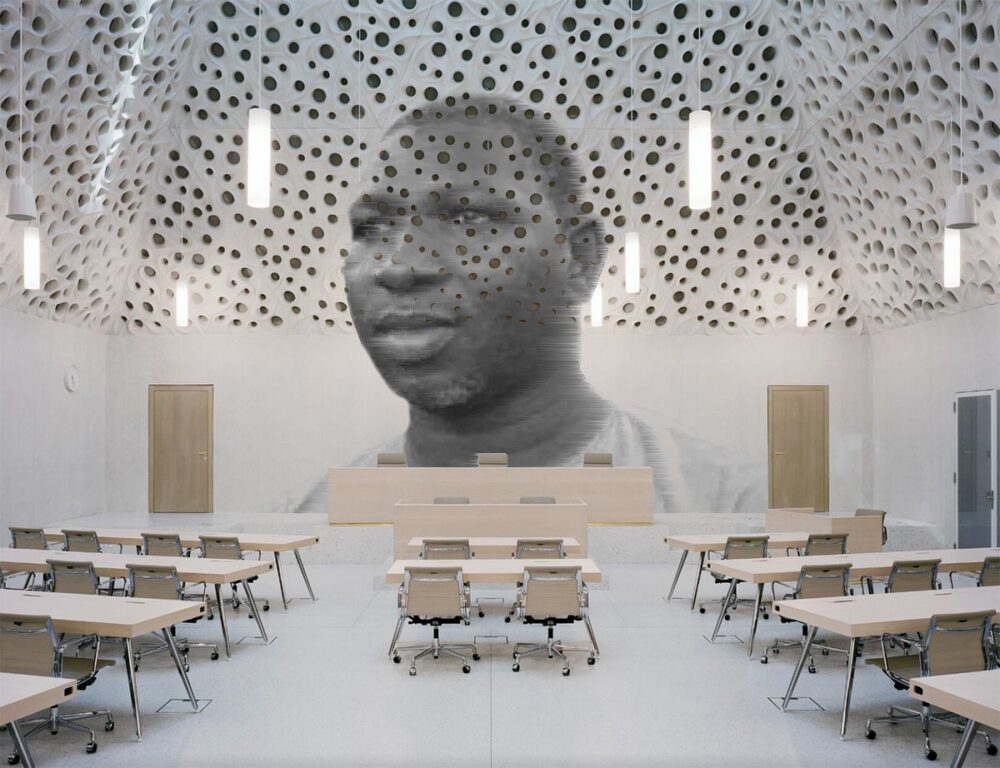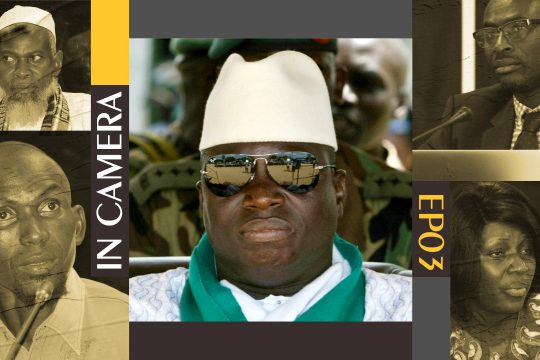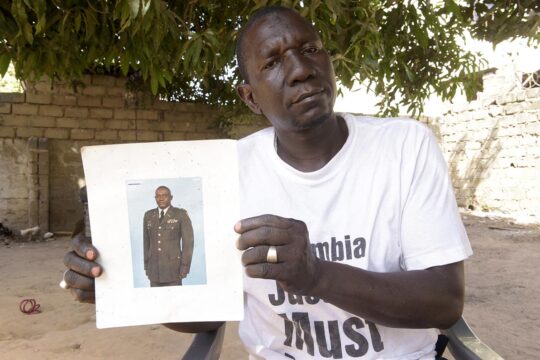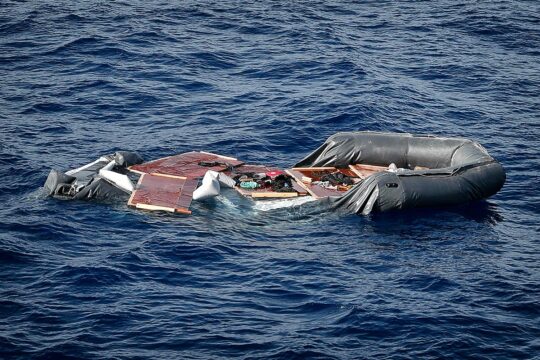Baba Jobe was a business partner and close ally of Yahya Jammeh, who ruled The Gambia with an iron fist from July 1994 to January 2017. He enjoyed a great degree of power and popularity during the time he worked in government. He was the majority leader in parliament for the Alliance for Patriotic Reorientation and Construction, Jammeh’s party. Then he fell out with the dictator.
In March 2004 Baba Jobe was convicted for economic crimes. He served his prison term of 9 years and eight months at Mile 2 prison, on the outskirts of Banjul, Gambia’s capital city. But when he completed his sentence he was not released. According to his wife Tida Jaiteh’s testimony before the Gambian Truth, Reconciliation and Reparations Commission (TRRC), when she asked the director general of Mile 2 prison David Colley about her husband’s release after he completed his sentence, Colley referred her to the Interior Minister Ousman Sonko, who she said never accepted her request to meet despite her coming to his office on three occasions.
This is when a number of “Junglers”, Jammeh’s death squad – Omar “Oya” Jallow, Pa Sanneh, Michael Jatta, Malick Manga, Mustapha Sanneh, Nfansu Nyabally, Sulayman Sambou and Momodou Jarju alias Rambo – were given access to the room of Baba Jobe, where he was suffocated with his blanket, according to Omar Jallow’s testimony before the TRRC.
Lamin Sanneh’s testimony
On the day Baba Jobe was killed, a prison guard was deployed to the Edward Francis Small Teaching Hospital to watch over him. This guard was Lamin Sanneh. On January 15, the Swiss Federal Court in Bellinzona, where Ousman Sonko is being tried for crimes against humanity, heard from prison officers of The Gambia Prisons Services. This was the first time Sanneh, a former orderly to Colley (now deceased), publicly testified about the murder of Baba Jobe. He had not come forward before the TRRC, although the commission had his written statement.
“It was on a weekend when I was called by Director General David Colley when I was informed that I was posted at the Edward Francis Small Hospital. The evening of 7 October 2011, I was informed by David Colley and told to go and guard Baba Jobe. He told me strange or unknown men would come and I should not challenge them, otherwise I would lose my life,” Sanneh told the court.
According to Sanneh, he did not know that the Junglers had come to kill Baba Jobe. The President of the court told the witness that when Omar “Oya” Jallow, one of the Junglers who confessed to the TRRC to participating in this operation, was interviewed by the Office of the Attorney General of Switzerland, he said: “The security guard that we met there knew. He said the patient was sleeping and the doctor had just left. When we went, we suffocated him and left.” But Sanneh denied he knew about the plan earlier on. “I was feeling very bad because had I known about it before I went there, it was better for me to resign,” he said.
Asked if Colley mentioned that he received these instructions from Ousman Sonko, the witness said: “He did not tell me that but I knew that whatever David was doing, the minister was aware. David will feed the minister [with information]. He will feed him in and out of the prisons daily, whatever is going on there.”
It was put to the witness that several individuals, as well as media reports, said Jammeh was responsible. The witness was slightly reluctant to comment on this. “I cannot say that it’s true. Maybe what they said is true, but I can’t say that it’s done by Jammeh.“
When asked why Colley chose him specifically for this operation, Sanneh said: “They just sacrificed me. I was being sacrificed. This is how I see things. Because normally, it’s not supposed to be like that.”
Sonko’s defence
The court told the accused that Colley claimed that he had informed Sonko that Baba Jobe had fallen during an exercise with other prisoners and had been taken to the Edward Francis Small Teaching Hospital, and that a few days later Sonko had called to inform him about a visit to Baba Jobe by army member Nuha Badjie. According to Colley, when he informed Sonko that other prison officers were already on sight, Sonko asked him to send them away and replace them with a senior officer.
The defendant read out the statements of four prison officers – Lamin Sowe, Bakary Kujabi, Yahya P. Jarju and Momodou Jarju – who Colley had said were part of a panel to choose a guard who would be posted at the hospital. The four statements were made at the Gambia Police Force on March 14 and 15, 2018. The four officers denied being present at any such panel.
Since according to Colley’s claim, he wanted a senior officer deployed at the prison, Sonko’s defence lawyer asked his client whether Sanneh, who was an orderly at the time, was qualified for the task. “The rank Lamin Sanneh had at the time could not qualify him as a senior officer,” Sonko replied.
“Baba Jobe was sick and taken to Edward Francis Small Hospital. He was admitted at the main ward, that is the ‘Shell’ ward. It was on the orders or executive directives from the State House that he was moved to the private block and this executive directive was communicated to him [Baba Jobe] by two management [staff] at the hospital,” Sonko explained in response to a question from his counsel. “David Colley as director general of prisons had special relations with the president. He was able to do some things without passing through the ministry. They came from the same village, and they had that bond in between them. So the president was able to talk to David Colley directly without even passing through the minister,” the accused further said.
When asked about the testimonies and media reports that said Yahya Jammeh was responsible for the killing of Baba Jobe, Sonko replied: “Baba Jobe was Majority leader in parliament representing APRC, that is the ruling party of Yahya Jammeh. So he was not a political opponent. He was charged for economic crimes, he was tried and sentenced accordingly. So I don’t consider him a political opponent.”
No post mortem
After Baba Jobe was killed, his body was handed over to his family without a post mortem being conducted. According to his widow, she did not allow it. She told the Gambia’s truth commission that they had suspicions that her husband was killed and that the post mortem would have been conducted by the very people who killed him. “The one that kills you pays you condolences and announces your death,” she testified to the TRRC.
“Was it you who instructed for the body to be given to the family?” the president of the court asked the accused.
“Yes, I did and it is based on an affidavit in which they [the family] swear that they don’t want a post mortem to be conducted. When [prison officer] Bakary Kujabi went with them to the hospital and they said they don't need post mortem to be conducted, they came to the ministry and they were asked to write it formally,” replied Sonko.
“You won’t take a human being there”
Asked about torture, Sanneh explained: “Well, throughout my experience, some inmates would be tortured whilst they are taken away. Those inmates, whenever you asked, they said they were taken to the NIA [National Intelligence Agency]. Most of the time, the Junglers would come there. They would pick inmates to NIA and after, when they bring them back, you would know that this guy has gone through something.”
Sanneh was not the only one to testify on prison conditions. Abdou Jammeh is both a former prison officer and a former prisoner at Mile 2, where he spent nine months in detention in 2016. He initially began testifying in Jola, a local dialect in The Gambia, and later changed to Mandinka. “Mile 2, I worked there and know people there,” he told the court. “It is not a clean place. It is not clean because when you see their toilet, you won’t take a human being there. Some places are big halls. Those in remand on trial, their cells are tight.”
According to both officers, they were not aware of any steps taken by former minister Sonko to improve prison conditions. When the defence lawyer put it to Sanneh that Colley, in his testimony before the TRRC, had said that maximum security facilities were controlled by the military, Sanneh said Colley was just running away from responsibility, “because as director general, nobody can come to your place and tell you what to do.”
Sonko contested this, claiming that during that period the military was responsible for the maximum security wing. “And up to the date I was relieved, state guards were responsible for the prisons except the main entrance where you had prison guards.”
“Did you have authority over the military?” asked Sonko’s lawyer.
“No,” replied the accused.







